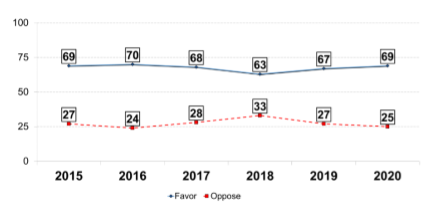 A new poll from a national education choice advocacy group shows voter support for education choice remains strong, especially among minorities, millennials and Republicans.
A new poll from a national education choice advocacy group shows voter support for education choice remains strong, especially among minorities, millennials and Republicans.
The American Federation for Children poll, in its sixth year, revealed overall support at 69 percent among likely 2020 general election voters.
Support was strongest among Latinos and Republicans, with 82 percent of each group saying they favored empowering parents to use tax dollars designated for education spending to send their children to the public or private school that best serves their needs.
Millennials also strongly expressed support at 71 percent, while African American support posted at 68 percent. The only group surveyed that did not show majority support was Democrats, polling at 48 percent.

Support was even greater for the proposed Education Freedom Scholarship, a federal scholarship tax credit that allows individuals and businesses to donate to instate nonprofit scholarship granting organizations that would provide scholarships for students to attend public, private, or career or technical schools of their choice. Seventy-eight percent of respondents overall – up 9 percentage points from last year – backed the program, including 83 percent of both Latinos and African Americans.
Millennials were not far behind with 78 percent approving. Seventy-seven percent of Republicans expressed support compared with 67 percent of Democrats.
Florida, which has been at the forefront of education choice nationally, is among about 18 states that offer a tax credit scholarship. The Florida Tax-Credit Scholarship program, administered by Step Up for Students, which hosts this blog, allows lower-income families to choose from a broad spectrum of private schools that participate in the program.
“This national survey is the premier benchmark for school choice opinion research across the country, and voters have consistently stated that they support these policies and want more K-12 options for their children,” John Schilling, president of the American Federation of Children, said in a news release Friday. “We fundamentally believe that every family, especially lower-income families, should have the freedom to choose the best K-12 education for their child—and the vast majority of Americans agree with us.”
A majority of respondents who said they plan to vote in their state’s Democratic presidential primary said they would be less likely to vote for candidates who say they want to eliminate federal funding for charter schools. Among those candidates are Bernie Sanders and Elizabeth Warren, both of whom have called for a temporary or permanent end to the $340 million program.
According to the poll, 56 percent of Democrats said that position would make them less likely to support a specific candidate. Among Latinos, 65 percent shared that view, compared with 62 percent of African Americans.
The poll also provided a breakdown of education choice options. For the fourth year in a row, support increased for education savings accounts, one of the most popular forms of school choice, with 80 percent of respondents backing the concept. Opposition to ESAs was at 14 percent, representing a drop of 2 percentage points from last year.
In 2014, Florida approved the Gardiner Scholarship program, an ESA that allows parents of children with unique abilities to personalize their child’s education by directing money toward a combination of programs and approved providers. Approved expenses include tuition, therapy, technology and a college savings account. Gardiner Scholarships serve 13,000 students and vary according to grade and county, with the amount for most students in 2019-20 averaging $10,400.
The survey fielded January 7-13 among 1,275 likely November 2020 voters. Interviews were conducted via live callers on landline and cell phones in English and Spanish. The base sample margin of error is +/- 3.5%.


